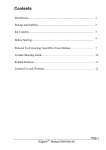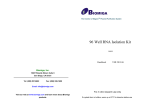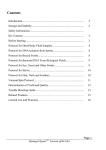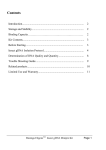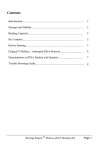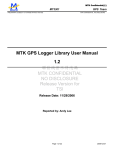Download Kit Manual
Transcript
Contents Introduction…………………………………………………………….. 2 Storage and Stability........................................................................……. 2 Kit Contents.......................................................................................…… 3 Safety Information………………………………………………………. 3 Before Starting.................................................................................……. 4 Disruption and Homogenization of Samples…………………………… 5 Removal of Genomic DNA……………………………………………. 6 Stabilization of RNA in Harvested Animal Tissues……………….……. 6 RNA Quality……………………………………………………………. 6 EZgene™ 96-Well Tissue RNA Protocol………………………………. 7 Trouble Shooting Guide....................................................................…… 11 Related Products…………………………………………...……………. 12 Limited Use and Warranty..…………………………………………….. 12 Biomiga EZgeneTM Tissue RNA Kit Protocol Page 1 Introduction The EZgeneTM 96 Well Tissue RNA Kit provides an easy and fast method for isolating total RNA from animal tissues, including some difficult fibrous tissues such as skeletal muscle, heart and aorta tissue. Only trace genomic DNA exists in the purified RNA, which can be eliminated by DNase I treatment (See detail in the protocol) when it is necessary. This kit purifies up to 50 µg of total RNA from animal tissues. The purified RNA is ready for RT-PCR. Storage and stability DNase I (optional) and Proteinase K should be stored at -20°C. All other components can be stored at room temperature. All kit components are guaranteed for 1 year from the date of purchasing. Page 2 Biomiga EZgeneTM Tissue RNA Kit Protocol Kit contents Catalog# R6811-00 R6811-01 R6811-02 1 x 96 4 x 96 20 x 96 96-well RNA Plate 1 4 20 96 Deep-well Plate 3 12 60 96-well Collection Plate (500 µL) 1 4 20 Buffer LY 40 mL 160 mL 2 x 400 mL Buffer RB 125 mL 500 mL 5 x 500 mL RNA Wash Buffer* 40 mL 2 x 80 mL 10 x 80 mL DEPC-Treated ddH2O 25 mL 100 mL 500 mL Proteinase K 28 mg 4 x 28 mg 550 mg DNase I (RNase-free, 2U/µL)** 500 U 2000 U 5 x 2000 U (250 µL) (1000 µL) (5.x.1mL) 1 x DNase I Buffer** 5 mL 20 mL 100 mL DNase Stop Buffer 24 mL 100 mL 5 x 100 mL RNase Inhibitor (40 U/μL) ** 50 µL 200 µL 5 x 200 µL 1 1 1 Preps User Manual *DNase I and RNase Inhibitor not supplied. They could be purchased from Biomiga *Add 160 mL (R6811-00) or 2 x 320 mL (R6811-01) or 10 x 320 mL (R6811-02) 96-100% ethanol to RNA Wash Buffer before use. ** DNase I and 1 x DNase I Buffer are shipped separately by ice. Safety information Buffer LY contains chaotropic salts, which may form reactive compounds when combines with bleach. Do not add bleach or acidic solutions directly to the preparation waste, wear gloves and protective eyewear when handling. Biomiga EZgeneTM Tissue RNA Kit Protocol Page 3 Before starting Prepare all components and get all necessary materials ready by examining this instruction booklet and become familiar with each steps. Important Determine the volume of Buffer LY to be used and add 20 µL of - mercaptoethanol (-ME) per 1 mL Buffer LY before use. Buffer LY contains -ME can be stored at room temperature for up to 1 month. Crystals may form in Buffer LY, dissolve the precipitates at 37oC before use. Add 160 mL (R6811-00) or 2 x 320 mL (R6811-01) or 10 x 320 mL (R6811-02) 96-100% ethanol to RNA Wash Buffer before use. Reconstitute Proteinase K with 1.1 mL (R6811-00) or 4 x 1.1 mL (R6811-01) or 22 mL (R6811-02) DEPC-Treated ddH2O, Vortex vial briefly and aliquot into adequate portions. Store aliquots at -20 o C. Add 36 mL (R6811-00) or 150 mL (R6811-01) or 5 x 150 mL (R6811-02) 100% ethanol to DNase Stop Buffer before use. All centrifuge steps must be carried out at 22 oC. Materials supplied by users Centrifuge with swinging-bucket capable of 4000 g Rotor and adapter for 96-well plate Water bath or heat block preset at 55 oC 100% ethanol -mercaptoethanol RNase-free pipette tips Disruption and homogenization of tissue samples Page 4 Biomiga EZgeneTM Tissue RNA Kit Protocol It is critical to disrupt and homogenize the samples completely and properly for high quality RNA yield. The purpose for homogenization is to reduce the viscosity by shearing genomic DNA and other high molecular weight cell components to create a homogenous lysate. Incomplete homogenization may result in clogging the well and reducing the RNA yield. 1. Sample disruption by mortar and pestle Excise tissues and freeze in liquid nitrogen immediate. Grind the sample with ceramic mortar and pestle to a fine powder under liquid nitrogen. Transfer the suspension into a tube pre-chilled in liquid nitrogen and allow the liquid nitrogen to evaporate while the samples remain frozen. Add Buffer LY before the sample gets thawed. Homogenization using homogenization columns It is a fast and efficient way to homogenize the samples using Biomiga’s homogenization column. Up to 700 μL of samples can be loaded per column. Homogenization columns are supplied in the Plant RNA Kit and can be purchased separately for use with the tissue RNA kit. 2. Rotor-Stator for sample disruption and homogenization Using a proper size probes and generator, the process simultaneously disrupts and homogenizes most of samples. 3. Bead milling for sample disruption and homogenization Cells and tissues can be disrupted and homogenized by rapid agitation in the presence of glass beads in Buffer LY. Use 4-8 mm glass beads for animal tissues, 0.5 mm for yeast cells and 0.1 mm for bacterial samples. 4. Biomiga EZgeneTM Tissue RNA Kit Protocol Page 5 Removal of genomic DNA using DNase digestion DNA digestion is necessary for downstream applications that are sensitive to very small amounts of DNA, for example, RT-PCR with low-abundance target. Generally, it is not required to do so since the EZgene RNA purification kit selectively isolates RNA and eliminates most of the DNA. If there is DNA contamination, either reduces the tissue amount or cell Stabilization of RNA in harvested animal tissues The intact of RNA in harvested tissue will be protected with the addition of RNASecure solution (Biomiga, catalog# R1011). 1. Cut the tissue into slices less than 0.5cm thick and immediately add at least 15 volumes of RNAsecure solution, for example, 150 uL RNAsecure solution per 10 mg tissue. 2. Store at room temperature for up to 24 hours, at 4°C for up to a week, and –20°C or –70°C for long term. RNA quality It is highly recommended that RNA quality be determined before downstream applications. The quality of RNA can be assessed by denatured agarose gel electrophoresis with the ethidium bromide staining. Several sharp bands should appear on the gel including 28S and 18S ribosomal RNA bands as well as certain populations of mRNA and bands. If these bands smear towards lower molecular weight RNAs, then the RNA has undergone major degradation during preparation, handling or storage, RNA molecule less than 200 bases in length do not efficiently bind to each well. An A260/A280 ratio of 1.8-2.0 corresponds to 90-100% pure nucleic acid. Page 6 Biomiga EZgeneTM Tissue RNA Kit Protocol EZgene™ 96-Well Tissue RNA Protocol 1. Excise the tissue sample from animal or from storage. 2. Weight 10 mg tissue and place it into suitable vessel for disruption and homogenization. Do not use more than 15 mg tissue. 3. Add 300 µL Buffer LY/-mercaptoethanol (-ME) and disrupt tissue and homogenize issue in Buffer LY as described in previous section. Note: Rotor-Stator or Beads Mills normally can result in higher RNA yield because they provided better disruption and homogenization. Note: -mercaptoethanol is key in denaturing RNases and must be added to an aliquot of Buffer LY before use. Add 20 µL of mercaptoethanol per 1 mL of Buffer LY. This mixture can be stored for 1 week at room temperature. 4. Transfer the homogenized lysate into a new 96 Deep-Well plate (Supplied). 5. Pipet 600 µL DEPC-Treated ddH2O to each sample and add 10 µL proteinase K solution and mix throughly by pipetting. Incubate at 55oC for 10 minutes. 6. Centrifuge at 4,000 x g for 15 minutes at room temperature. A thin layer or film will form on top of the supernatant. 7. Transfer the supernatant into a new 96 Deep-Well plate. (Supplied). Biomiga EZgeneTM Tissue RNA Kit Protocol Page 7 Note: after transfer the supernatant, keep the 96 Deep-well plate for the use of collection for step 9. Note: Avoid transferring any of pellet. Hold the pipett tip under the thin layer or film on top of the supernatant, if present. This layer will usually adhere to outside the tip and should not be transferred. 8. Add 0.5 volume (around 450 µL) of absolute ethanol (96-100%) to the cleared lysate, mix throughly by pipetting or vortexing. 9. Place an EZgene™ 96 Well RNA Plate on top of the 96 Deep-well plate from step 4. 10. Carefully apply 700 µL samples from step 8 (including any precipitate) to EZgene™ 96 Well RNA Plate. 11. Spin at 4000 x g for 5 min at room temperature. 12. Transfer the remaining samples to EZgene™ 96 Well RNA Plate. Note: after transfer of the lysate, keep the 96 Deep-well plate for the use of collection for step 14. 13. Centrifuge at 4000 x g for 5 minutes. 14. Remove the EZgene™ 96 Well RNA Plate and place it onto a 96 Deep-Well plate from step 12. 15. Pipet 350 µL Buffer RB into each well. Centrifuge at 4,000 x g for 5 minutes. Page 8 Biomiga EZgeneTM Tissue RNA Kit Protocol 16. Prepare the DNase I solution: For 96 samples, in a 15 mL microtube, add 250 µL DNase I and 100 µLRNase Inhibitor to 7.15 mL 1 x DNase I Buffer Mix gently by inverting the tube. Do not vortex, DNase I is especially sensitive with physical denaturation. 17. Add 75 µL DNase I solution onto the middle of each well of EZgene™ 96 Well RNA Plate and incubate at room temperature for 15 min. Add 200 µL DNase Stop Buffer onto each well and centrifuge at 4,000 x g for 5 min. 18. Add 200 µL RNA Wash Buffer to each well and centrifuge at 4,000 x g for 5 min. 19. Add 800 µL Buffer RB to each well of the EZgene™ 96 Well RNA Plate. Wait 5 minutes and Centrifuge at 4000 x g for 5 minutes at room temperature. 20. Place the EZgene™ 96 Well RNA Plate on to of a new 96 Deep-Well Plate. Add 800 µL RNA Wash Buffer to each well of the EZgene™ 96 RNA Plate. Centrifuge at 4000 x g for 5 minutes at room temperature. 21. Add another 800 µL RNA Wash Buffer to each well of the EZgene™ 96 Well RNA Plate. Centrifuge at 4000 x g for 10 minutes at room temperature. 22. Place the EZgene™ 96 Well RNA Plate on top of a new 96 well collection plate (supplied). Biomiga EZgeneTM Tissue RNA Kit Protocol Page 9 23. Add 75 µL DEPC-Treated ddH2O onto center of membrane in each well of the plate. Centrifuge at 4000 x g for 4 minutes at room temperature. 24. Repeat the elution step (step 23) once with second 75 µL DEPC Treated ddH2O.Seal the plate contains purified RNA and store at 70℃ Page 10 Biomiga EZgeneTM Tissue RNA Kit Protocol Troubleshooting Guides Problem Cause Suggestion Little or no RNA eluted RNA remains on the membrane Clogged wells Overloaded sample Reduce quantity of starting material Incomplete lysis Degraded RNA Source RNase contamination Problem in downstream applications Salt carry-over during elution Inhibitors of PCR DNA contamination Abnormal OD reading on A260/A280 Repeat elution Pre-heat DEPC-water to 70℃prior to elution Incubate for 5 min with water prior to elution Mix thoroughly after addition of Buffer LY Reduce amount of starting material Do not freeze and thaw sample more than once Follow protocol closely, and work quickly Low concentration of virus in the sample Ensure not to introduce RNase during the procedure Check buffers for RNase contamination Ensure RNA Wash Buffer has been diluted with 4 volumes of 100% ethanol as indicated on bottle 1 X RNA Wash Buffer must be stored at room temperature Repeat wash with RNA Wash Buffer Use less starting material Prolong incubation with Buffer LY to completely lyse cells Make sure to perform RNase-free DNase Digestion correctly DEPC residue remains in DEPC-water Remove DEPC by Autoclave Use 10mM Tris-HCl, not the DEPC water to dilute the sample before measuring purity Biomiga EZgeneTM Tissue RNA Kit Protocol Page 11 Related EZgeneTM products Catalog # Product Name Preps Price $ R6311-01 Tissue RNA kit 50 150.00 R6311-02 Tissue RNA kit 250 650.00 R1011-01 RNASecure Solution 50 mL 45.00 R1011-02 RNASecure Solution 250 mL 150.00 R6312-01 Tissue RNA midi kit 10 80.00 R6312-02 Tissue RNA midi kit 20 160.00 R6314-01 Tissue RNA maxi kit 10 120.00 R6314-02 Tissue RNA maxi kit 25 270.00 R6811-01 96-well tissue RNA kit 4x96 780.00 R6811-02 96-well tissue RNA kit 20x96 3300.00 R6411-01 Blood RNA mini kit 50 150.00 R6411-02 Blood RNA mini kit 250 680.00 R6812-01 96-well blood RNA kit 4x96 780.00 R6812-02 96-well blood RNA kit 20x96 3500.00 Limited use and warranty This product is warranted to perform as described in its labeling and in Biomiga’s literature when used in accordance with instructions. No other warranties of any kind, express or implied, including, without limitation, implied warranties of merchantability or fitness for a particular purpose, are provided by Biomiga. Biomiga’s sole obligation and purchaser’s exclusive remedy for breach of this warranty shall be, at the option of Biomiga, to replace the products, Biomiga shall have no liability for any direct, indirect, consequential, or incidental damage arising out of the use, the results of use, or the inability to use it product. Page 12 Biomiga EZgeneTM Tissue RNA Kit Protocol












